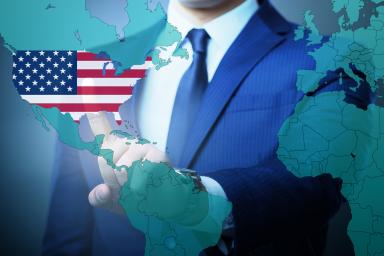How Do I Get a Visa if My Country Doesn’t Have an American Embassy?

The United States has established diplomatic relations in over 190 countries worldwide, but some agencies have temporarily suspended or reduced their service offerings due to the pandemic. Certain U.S. Consulates and Embassies were forced to adjust their operating capabilities due to local country regulations and conditions during COVID-19. If you reside in a country where the U.S. does not have a diplomatic presence, there are other U.S. Embassies or Consulates that can assist in processing your visa.
Which Countries Do Not Have Diplomatic Relations With America?
Though the United States has formal diplomatic relations with most nations, there are a few countries and observer states where the U.S. does not have a diplomatic presence:
Bhutan
Iran
North Korea
Syria
State of Palestine (U.S does not recognize this state)
COVID-19 and the Ukraine-Russia war have also forced the closures of diplomatic branches, and there are geographic constraints that maintain diplomatic relations but do not have a formal presence in these countries.
How Do I Apply for a Non-Immigrant & Immigrant Visa if My Country Doesn’t Have a U.S. Embassy?
The non-immigration and immigrant visas are similar if you reside in a place without a local embassy. During the visa process, there is not much distinction between the two types of visas sought. If you’re a citizen in a country that does not have a U.S. Embassy or perhaps the post closed, there are alternative options for pursuing an immigrant or non-immigrant visa.
Neighboring Agency
For many citizens seeking a non-immigrant visa in places without a U.S. Embassy, the first option is to check if any neighboring countries are processing applications from third-country nationals. For example, due to the recent closure of the U.S. Embassy in Moscow, Russia, the United States designated the U.S. Embassy in Warsaw, Poland, as the processing center for Russian immigrants. The United States Department of State often accommodates visa seekers in nearby countries, though there are limitations.
Applicants should contact the U.S. Embassy or Consulate where they wish to apply to ensure they are accepting applications from third-country nationals for the visa type sought. Due to language barriers, certain U.S. Embassies or Consulates may be unable to accommodate applicants if the interviewing officer is not trained to speak the third-country language. Additionally, nearby countries may be unfamiliar with the visa process for third-country nationals. Folks in these cases should also know that they are responsible for transportation and hotel costs in the nearby country during their visa interview and issuance process. It's important for citizens to be aware that medical expenses and visa medical exams are not covered when traveling to a neighboring country. It's best to understand the total cost beforehand.
Other special circumstances that impact operational capacity are security risks, political conflict, or natural disasters, and citizens may be redirected to neighboring countries to process their applications. For instance, applicants from Syria have been processed by the U.S. embassy in Jordan, and Libyan applications have been processed by the U.S. Consulate in Tunisia.
Contested Territories
The United States government will sometimes maintain a diplomatic presence in places that it does not, for whatever reason, formally recognize as sovereign. For instance, before the Trump Administration closed the consulate, Palestinians could process their visa applications at the consulate in Jerusalem.
In some of these contested territories, the U.S. has created special organizations to provide consular and pseudo-diplomatic services. For example, though not formally recognized as independent by the U.S. since 1979, the U.S. offers visa services inside the territory of Taiwan through the non-profit organization: The American Institute in Taiwan.
Geographic Convenience
Geographic constraints also factor into whether the U.S. has a physical diplomatic office where citizens can go for their visa applications. Residents of Grenada, Saint Lucia, and other small Caribbean islands must apply for their visas at embassies in designated nearby countries.
There are also instances where the U.S. government maintains a virtual presence without a physical post, like the U.S. Virtual Consulate in Gaze, which serves as a platform for residents in Palestinian territory.
Legal Resources for Immigrants
Before you contact an immigration attorney, educate yourself on the resources at your disposal for potential immigrants. Many organizations seek to simplify the immigration process and assist in citizenship, some on a reduced-fee or no-fee level. If finances are a barrier to becoming a U.S. citizen, consider contacting one of the organizations below dedicated to helping immigrants find effective immigration legal representation.
Find a top-ranked Immigration Lawyer
If you need an immigration attorney familiar with U.S. immigration law, you can search for a top-ranked attorney here. An immigration lawyer provides legal advice, prepares visa and green card applications, and represents clients in administrative hearings and immigration courts.
Immigrant Legal Resource Center
For more than forty years, the Immigrant Legal Resource Center (ILRC) has educated and assisted attorneys and legal advocates in their work to help immigrants and their families. You can find an immigration preparedness toolkit on their website, available in English and Español. This free toolkit offers in-depth and easily accessible information that outlines the basics of various immigration topics. This resource also features links to helpful reference documents, fact sheets, and tools users can use to create personalized plans.
Immigration Process Guide
If you have questions about the immigration process, like which forms to file and how much it’ll cost—ImmigrationHelp.org streamlines the application process for many aspiring immigrants. Their team of immigration legal experts designed a series of eligibility and form prep tools that simplify the visa process and are entirely free to use. You can even check out current USCIS processing times, and users can even pay for 1-on-1 consultations with their legal team to go over strategy and review documents.
National Association of the Deaf
Many public and private attorneys are not well-versed in ADA requirements and accommodations for folks who are deaf or hard of hearing. The National Association of the Deaf (NAD) is dedicated to bridging this gap by providing equal access to legal services for those who are deaf or hard of hearing. The NAD is committed to improving the accessibility of legal services by providing necessary accommodations such as qualified interpreters, CART, and assistive listening devices. The NAD can aid local attorneys in accessing their state communications access fund (CAF), which covers the cost of communication access services.
Expertise.com StaffAuthor
Step into the world of Expertise.com, your go-to hub for credible insights. We don't take accuracy lightly around here. Our squad of expert reviewers, each a maestro in their field, has given the green light to every single article you'll find. From rigorous fact-checking to meticulous evaluations of service providers, we've got it all covered. So feel free to dive in and explore. The information you'll uncover has been stamped with the seal of approval by our top-notch experts.

![Immigration Filing Fees | Everything You Need to Know [2023]](https://images.ctfassets.net/k00sbju4hbzq/1z5Y0E3qpnPbB3GghYQNeV/7d13766b5f1f0d5929fb0b483cf4f355/Depositphotos_655366228_XL.jpg?fit=fill&w=384&q=75)

![How Much Does an Immigration Lawyer Cost? [2023]](https://images.ctfassets.net/k00sbju4hbzq/6lQaWmJpvQJ7e7sWT6YYuI/e09100f6ad7c67d638a6e35bcf173739/Depositphotos_153078350_XL.jpg?fit=fill&w=384&q=75)
